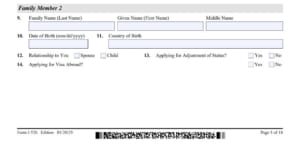A nonimmigrant visa is for persons wanting to enter the U.S. for a temporary visit for a specific purpose and who will leave the U.S. when the purpose of their visit is finished. In most nonimmigrant visa categories, this is called establishing “nonimmigrant intent”.
 The most common nonimmigrant visas are the B-1/B-2 and the F-1 student visa. A B-1/B-2 visa is for persons who want to temporarily enter the U.S. for business or tourism. An F-1 visa is for students to enter the U.S. for study. Even though the entry is considered temporary, it could still result in a long stay in the U.S., such as a student entering the U.S. to study a 4-year undergraduate degree. During this time in the U.S. students must maintain their nonimmigrant intent until their studies are complete.
The most common nonimmigrant visas are the B-1/B-2 and the F-1 student visa. A B-1/B-2 visa is for persons who want to temporarily enter the U.S. for business or tourism. An F-1 visa is for students to enter the U.S. for study. Even though the entry is considered temporary, it could still result in a long stay in the U.S., such as a student entering the U.S. to study a 4-year undergraduate degree. During this time in the U.S. students must maintain their nonimmigrant intent until their studies are complete.
An immigrant visa, such as an EB-5 immigrant investor visa, is for persons who want to live permanently in the United States. Persons who have filed an immigrant petition to immigrate (a Form I-526 Petition for EB-5 investors) have expressed their intent to immigrate to the United States. Thus, if that same person applies for a nonimmigrant visa, this prior immigrant intent conflicts with the nonimmigrant intent needed to qualify for a nonimmigrant visa to (and entry into) the United States.
Fortunately, it is logical and possible for a person to demonstrate a future intent to immigrate but only wants to make a more immediate temporary entry.
When applying for a nonimmigrant visa (or entry into the U.S.), it is important that you are able to demonstrate your specific reason for applying for that visa or entry. The person entering the U.S. on a common B-1/B-2 visa is not allowed to reside, or live permanently, in the United States while waiting for an immigrant visa to become available.
When applying for the visa or requesting entry into the U.S. at a port of entry, you will need to explain clearly the purpose of your travel to the United States. If at any time you are questioned whether you or anyone has filed a petition for you to immigrate, you should explain that you have filed an I-526 Petition for the EB-5 visa category. This includes the EB-5 Petitioners spouse and eligible children. This could be on the visa application at the U.S. Consulate, at the visa interview at the Consulate, or even at a port of entry. If you can demonstrate the purpose of your temporary visit, usually this is not an issue. However, failure to disclose this information could result in a finding of misrepresentation. A finding of misrepresentation may result in permanent ineligibility to enter the United States.
The purpose of the trip will be important. If you have to make a trip for a specific reason, such as for a business trip, then this will usually be an acceptable reason for making a short temporary entry.
Traveling to the U.S. to buy a house or business as an investment may also be acceptable. However, going to buy a house and find a school for your children in anticipation of immigrating may be a problem, and bringing the children and luggage full of personal items and documents that appear that you will stay and live there, is a bad idea.
It is safest that you and your family do not apply for any nonimmigrant visas while waiting for the EB-5 petition and visa application process to be completed. If you decide to apply for a nonimmigrant visa or if you already have a nonimmigrant visa, be sure that you understand the requirements of entry and to document your nonimmigrant intent at that time of your application and entry.
If you have any questions about the EB-5 visa or other U.S. visas, please contact us at




